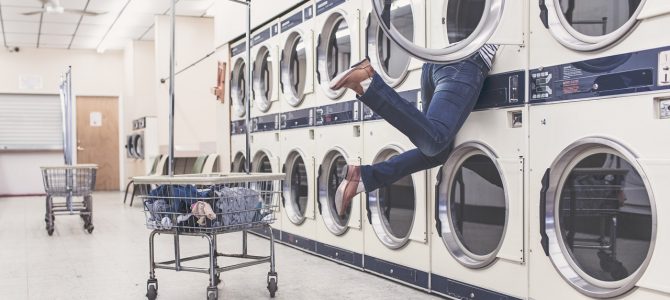
Five years ago, I purposely violated a social norm that not even a six-year-old would dare to break (or at least not one in Sister Clarentine’s first grade class). I cut in line. Not only did I cut in line, when challenged I ignored the lady who confronted me and continued to hold my undeserved place at the front of the queue.
You see, I felt I had no choice: I had to be at the hospital at 7 a.m. for a medical test; my husband had to be at work by 8 a.m.; and we had a one-year-old at home with cystic fibrosis and had yet to find another caregiver who could administer his many required medicines and treatments. And I had to get a blood draw before heading to the hospital.
I planned it out perfectly, or so I thought. The local lab opened at 6:30 a.m. I would arrive at 5:55, and be first in line. The hospital was less than a mile away, and as long as I was first in the door, I’d be able to have my blood drawn quickly, get to the hospital, have the test done, and get home in time for my husband to make it to work for his meeting.
But when I pulled into the parking lot, three cars were already there. Providentially, it was a cold morning, so the other people were waiting in their cars. By cold, I mean Michigan, one-of-the-coldest-winters-on-record cold. I paused for a second and then, as any desperate mother would do, I jumped out of the car and walked briskly to the front door.
In an effort to salvage some semblance of self-respect, I tried the door, pulled a puzzled face, and feigned surprise the lab wasn’t open yet. I then waited inches from the door to prevent anyone else from entering before me, and to avoid the biting wind. I tried to read some work I had brought with me (I work part-time from home so I can care for our son), but between my mortification over my misdeed and my attempts to keep my toes, nose, and fingers from freezing, I didn’t get much accomplished over the next 30 minutes.
As it neared 6:30, the others left the warmth of their cars and filed in line. One lady, though, didn’t go behind me or the others, but stood across from me. I could feel her eyes attempting to pierce mine, as she said with faux sincerity and a little lilt in her voice, “It looks like we all got out of order.” “Do not make eye contact,” I told myself, as I re-read the same sentence at least ten times. I just stood there in silence, riveted to the words I wasn’t reading, while the lab tech opened the door.
As I entered, I immediately started chatting cheerfully with the tech, as if to proclaim to the others, “See, I’m really a nice, normal, friendly type.” The next part went according to plan—as the “first” there, I was in and out within ten minutes, made it to the hospital, had the tests done, returned home, saw dear husband off, and started our son’s hour-long morning routine of medicines and respiratory therapy.
Thanks to a Friend, This Changed My Life

But I felt horrible. I needed absolution. So as any modern, home-bound mom with a little one who screams if you pick up the telephone would do, I texted my closest friend. I told her the whole sordid story, knowing she knew everything on my plate and would make me feel better. What she said, though, wasn’t comforting as much as it was life-changing. After a moment commiserating with me, she said, “It sure makes you want to give people the benefit of the doubt, doesn’t it?”
Since then, that’s been my new mantra in life. Before then, I had looked at rude people as just that—rude people—and my role in life was not to put up with their crap. Sure, I could be compassionate, abundantly so if I knew of someone’s situation or even if I could tell someone was having a bad day. But I never gave people the benefit of the doubt.
I vividly remember—painfully now—the day I called the supervisor of a furniture delivery man to complain after he had made my administrative assistant cry. I learned from the supervisor that the man’s wife was battling cancer. I immediately expressed concern for him and understanding for his rudeness, but the supervisor wasn’t placated. If only I had given him the benefit of the doubt. I still might have called the supervisor, but I could have expressed my concern more compassionately—even if I didn’t know there was a reason I needed to be compassionate.
Lots of Other People Know How It Is, Too
These days, with the progression of our son’s disease, the constant worries, and the revolving medical crises, I’m more likely the person in need of that benefit of the doubt. In some ways I’m lucky because I usually wear my stress, sadness, and worry for all to see. With the need obvious, I’ve met kindness from so many, such as the UPS man who knew we had a sick baby and didn’t want to knock, but had to because he needed a signature. When he saw the tears in my eyes and asked if I was okay, I could only start sobbing, having spent the day at the hospital restraining our baby while they did a barium, well, you know. He hugged me. A real, honest-to-goodness, I-am-so-sorry hug.
There’s also the lady at the grocery store to whom I passed off my pop bottles at the over-crowded recycle center. (Remember, this is Michigan—think Seinfeld, “The Bottle Deposit,” and the Kramer-Newman cross-country trek to cash in on bottle returns.) I tersely said to her, arm outstretched, holding a bag of pop bottles, “I don’t have time to wait. Do you want my bottles?”
She took my bottles, stood in line, returned them separately from her own, then tracked me down in the store to give me my refund receipt. I was speechless: that simple act of kindness brought comfort to my heart on a day that I really needed it. Of course, I was also speechless the day when, sh
ortly after our newborn son’s diagnosis, another lady followed me around several aisles in a different grocery store only to ask me if I knew I was wearing two different shoes. I didn’t.
Fortunately, scores of people long ago learned (or maybe they always knew) what I only recently grasped: that you never know what is going on in someone’s life and that they just might need their shortness, rudeness, or even anger met with kindness. If you are one of those people who give us the benefit of the doubt, thank you. Truly, thank you.
If instead you are like I was, one of the mean-people-suck-and-I-won’t-put-up-with-it types, I’ll paraphrase what my dear friend Elizabeth said: “Life—it makes you want to give people the benefit of the doubt.”
Cystic fibrosis is a genetic, life-shortening disease. To learn more about Cystic fibrosis, or to support research to find a cure, please visit CFF.org.









